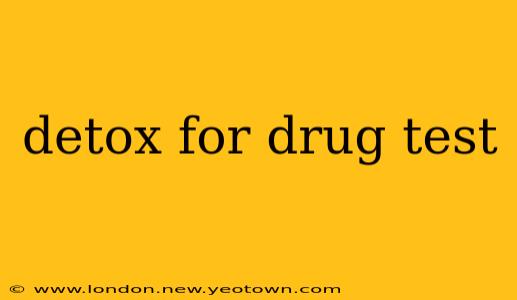Facing a drug test can be incredibly stressful, especially if you've used substances recently. The internet is awash with detox methods, some promising miraculous results, and others bordering on dangerous. This guide aims to provide a balanced and realistic perspective on detoxing for a drug test, exploring what works, what doesn't, and the potential risks involved. Remember, I am not a medical professional, and this information should not be taken as medical advice. Always consult a doctor or healthcare provider for personalized guidance.
What is a Drug Detox?
A drug detox, in the context of a drug test, refers to the process of attempting to eliminate detectable traces of drugs from your system before the test. This is different from medically supervised detox programs designed to help people withdraw safely from addictive substances. Medically supervised detox is a crucial part of addiction treatment and should only be done under professional care. We're focusing here on attempts to cleanse the system for a specific test.
How Long Do Drugs Stay in Your System?
This is crucial. The detection window for drugs varies significantly depending on several factors:
- Type of drug: Different drugs metabolize at different rates. Cocaine might be detectable for only a few days, while marijuana metabolites can linger for weeks or even months, depending on usage frequency and individual metabolism.
- Frequency of use: Regular users will generally have detectable levels for longer periods than infrequent users.
- Metabolism: Individual metabolic rates vary considerably.
- Method of ingestion: Smoking or injecting drugs generally lead to faster detection than oral ingestion.
- Body fat: Drugs can accumulate in body fat, extending detection times.
Can You Detox for a Drug Test Quickly?
This is the big question many people ask, and the answer is nuanced. While some methods claim rapid detoxification, their effectiveness is questionable and often unproven. There's no magic bullet. The best approach is to give your body enough time to naturally eliminate the substances through its own metabolic processes.
What are Some Common Detox Methods?
Several methods are claimed to help speed up the detoxification process. However, it's crucial to approach these with caution and realism:
- Drinking plenty of water: Staying hydrated is essential for overall health, and it helps your kidneys flush out toxins. However, it won't magically remove drugs from your system.
- Exercise: Exercise can help improve overall health, but its impact on drug elimination for a test is minimal.
- Saunas and sweating: While sweating can help eliminate some toxins, it's unlikely to significantly affect drug metabolites in your system.
- Detox drinks and pills: Many products claim to help you detox, but there's little scientific evidence supporting these claims. Some may even contain harmful ingredients.
What are the Risks of Attempting to Detox for a Drug Test?
Attempting rapid detox through unproven methods can be risky. Some methods may have harmful side effects. It's far more important to focus on a long-term, healthy lifestyle and, if struggling with substance use, seeking professional help.
Will a Detox Drink or Supplement Really Work?
The effectiveness of detox drinks and supplements is largely unsupported by scientific evidence. Many companies make bold claims, but rigorous studies are lacking. It's best to approach these products with a healthy dose of skepticism.
What's the Safest Way to Prepare for a Drug Test?
The safest way to prepare is to abstain from drug use. If you have concerns about a drug test, it's best to speak with your employer or whoever is administering the test. Honest communication is crucial. If you have substance use issues, seeking help from a healthcare professional or addiction treatment center is recommended.
This information is for informational purposes only and should not be considered medical advice. Always consult a qualified healthcare professional before making any decisions related to your health or treatment. Remember, focusing on long-term health and well-being is always the best approach.

